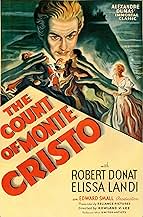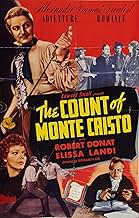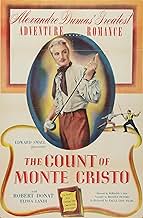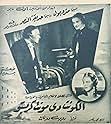IMDb-BEWERTUNG
7,4/10
3603
IHRE BEWERTUNG
Füge eine Handlung in deiner Sprache hinzuAfter greedy men have Edmond Dantes unjustly imprisoned for 20 years for innocently delivering a letter entrusted to him, he escapes to get his revenge on them.After greedy men have Edmond Dantes unjustly imprisoned for 20 years for innocently delivering a letter entrusted to him, he escapes to get his revenge on them.After greedy men have Edmond Dantes unjustly imprisoned for 20 years for innocently delivering a letter entrusted to him, he escapes to get his revenge on them.
- Auszeichnungen
- 3 wins total
Empfohlene Bewertungen
Alexandre Dumas' novel is a classic, and of a number of film adaptations, of which are a mixed bunch in terms of success, it's the 1934 film starring Robert Donat that I consider the best version. Maybe the editing in the escape scene is a little plodding, other than that the film is very handsomely mounted with lavish period detail and beautiful cinematography. Alfred Newman's score is suitably rousing, the story is the very definition of thrilling and never stops maintaining interest and the script is very literate and sometimes witty. The characters all engage, with the leads likable and easy to identify with and the villains suitably repellent. The swash-buckling also is never clumsy and Rowland V Lee directs beautifully. Robert Donat gives a performance that for me has only been bettered by the title role in Goodbye Mr Chips, expertly progressing from naive to calculating. Elissa Landi matches him in a sympathetic and moving performance, and Raymond Walburn is a sly Danglers, but other than Donat the other best performance is the sharp Villefort of Louis Calhern. Sidney Blackmer's Mondego is also splendidly characterised, and OP Heggie delights in a role that will remind one of the hermit in Bride of Frankenstein. Overall, wholly satisfying and definitely recommended. 9/10 Bethany Cox
No film version can substitute for reading the unabridged version of The Count of Monte Cristo. No doubt there is no substitute for reading it in French, but for English-speakers Robin Buss' 1996 English translation reportedly captures the both spirit and letter of Dumas' novel better than previous translations. In my opinion, the 1934 film also captures the spirit of the book, but omits many characters and story lines, and adds or rewrites others. Nevertheless, this film version is fun to watch.
This should be a classic. It is a superb motion picture. It has a brilliant cast. An excellent interpretation of what the author of the book wrote. The director and producer was of the top class.
This excellently made picture is one that those you can watch over and over again. It's not however going to be anyone's all time favourite because you can't help feeling that it could have been a bit better. It's a great film but the extra magic which a film like this should have seems missing.
It was the STAR WARS of its day. It's a proper big budget, exciting adventure story and although it's as old to us now as it was to the makers of this film from the writing of the novel, it's still the most accessible and easiest to watch. There are none of the old fashioned traits of silent movies sometimes seen in some 1930s films in this. Perhaps it's because it's set in the past but the style of acting feels absolutely perfect for a story like this. It's almost a classic.
Although as a film it's faultless, in the hands of a different director I am sure it could have been even better. The themes of vengeance, justice and hope are explored well but they don't quite engage on an emotional level. Had this been made by someone like David Lean - or possibly even by Michael Curtiz or George Cukor, the nuances of those themes could have spoken to our hearts rather than just to our heads. There's nothing wrong with this film at all, it's just lacks that spark of magic to raise it to the next level.
It was the STAR WARS of its day. It's a proper big budget, exciting adventure story and although it's as old to us now as it was to the makers of this film from the writing of the novel, it's still the most accessible and easiest to watch. There are none of the old fashioned traits of silent movies sometimes seen in some 1930s films in this. Perhaps it's because it's set in the past but the style of acting feels absolutely perfect for a story like this. It's almost a classic.
Although as a film it's faultless, in the hands of a different director I am sure it could have been even better. The themes of vengeance, justice and hope are explored well but they don't quite engage on an emotional level. Had this been made by someone like David Lean - or possibly even by Michael Curtiz or George Cukor, the nuances of those themes could have spoken to our hearts rather than just to our heads. There's nothing wrong with this film at all, it's just lacks that spark of magic to raise it to the next level.
I was lucky enough to obtain a video copy of an excellent black & white print of this movie, as I believe the colourisation of current copies falsifies the viewing experience. The photography and lighting are so exquisite, only the 1930's movie-making artists - it was an art form then - could accomplish it and it has to be appreciated like an antique: old, but immensely valuable for that.
They truly don't make them like this any more, and after having seen some of the subsequent screen versions, I still don't believe this one has ever been surpassed. I have also read Dumas' novel and would say that except for some minor alterations to the plot, the movie is largely true to the book.
Robert Donat is a dashing Dantes, whose ageing in body and spirit during the course of the movie is utterly believable (but he even improved on his ability to portray a physical and mental journey a few years later, when he made "Goodbye Mr. Chips"). Elissa Landi is a sweet and witty heroine, and the villains are so beautifully characterised (notably Sidney Blackmer's Mondego) that it becomes all the more satisfying when Dantes deals with them according to their own villainous traits.
I particularly enjoyed the intelligent flashes of irony with which the grim story is suffused, such as Dantes' double-speak as he flatters his enemies, at the same time telling them truth which they choose to misunderstand. The script is fantastic, the acting luminous. I feel sorry for those who hesitate to watch black & white classics like this one - they miss out on the very essence of what the art of movie-making and acting really used to be about.
They truly don't make them like this any more, and after having seen some of the subsequent screen versions, I still don't believe this one has ever been surpassed. I have also read Dumas' novel and would say that except for some minor alterations to the plot, the movie is largely true to the book.
Robert Donat is a dashing Dantes, whose ageing in body and spirit during the course of the movie is utterly believable (but he even improved on his ability to portray a physical and mental journey a few years later, when he made "Goodbye Mr. Chips"). Elissa Landi is a sweet and witty heroine, and the villains are so beautifully characterised (notably Sidney Blackmer's Mondego) that it becomes all the more satisfying when Dantes deals with them according to their own villainous traits.
I particularly enjoyed the intelligent flashes of irony with which the grim story is suffused, such as Dantes' double-speak as he flatters his enemies, at the same time telling them truth which they choose to misunderstand. The script is fantastic, the acting luminous. I feel sorry for those who hesitate to watch black & white classics like this one - they miss out on the very essence of what the art of movie-making and acting really used to be about.
Wusstest du schon
- WissenswertesThis is the version that "V" in V wie Vendetta (2005) claimed to be his favorite film.
- PatzerDuring the fencing duel between Dantes and Mondego, in one brief shot near the end Sidney Blackmer holds his sword in his left hand instead of his right, which he does in the rest of the scene. This was obviously a shown in reverse as is often done to add footage.
- Zitate
[last lines]
Albert de Mondego: [to Dantes and Mercedes who are up in the branches of a tree] Can we come up?
Edmond Dantes: Find your own tree.
- Crazy CreditsPrologue: "1815--Napoleon had achieved an empire and lost it again. Exhausted by years of revolution and war, France strove to make peace with her neighbors under the rule of King Louis XVIII....while the "Little Corporal," now in exile, reigned over only a few square miles of land--Elba. But the memory of his colorful career still endeared him to the hearts of the people, and his loyal followers were actively conspiring to return him to power."
- Alternative VersionenAlso available in a computer-colorized version.
- VerbindungenFeatured in MGM/UA Home Video Laserdisc Sampler (1990)
Top-Auswahl
Melde dich zum Bewerten an und greife auf die Watchlist für personalisierte Empfehlungen zu.
- How long is The Count of Monte Cristo?Powered by Alexa
Details
- Erscheinungsdatum
- Herkunftsland
- Offizieller Standort
- Sprachen
- Auch bekannt als
- Der Graf von Monte Christo
- Drehorte
- Produktionsfirma
- Weitere beteiligte Unternehmen bei IMDbPro anzeigen
Box Office
- Bruttoertrag in den USA und Kanada
- 3.270.000 $
- Laufzeit
- 1 Std. 53 Min.(113 min)
- Farbe
- Seitenverhältnis
- 1.37 : 1
Zu dieser Seite beitragen
Bearbeitung vorschlagen oder fehlenden Inhalt hinzufügen

























